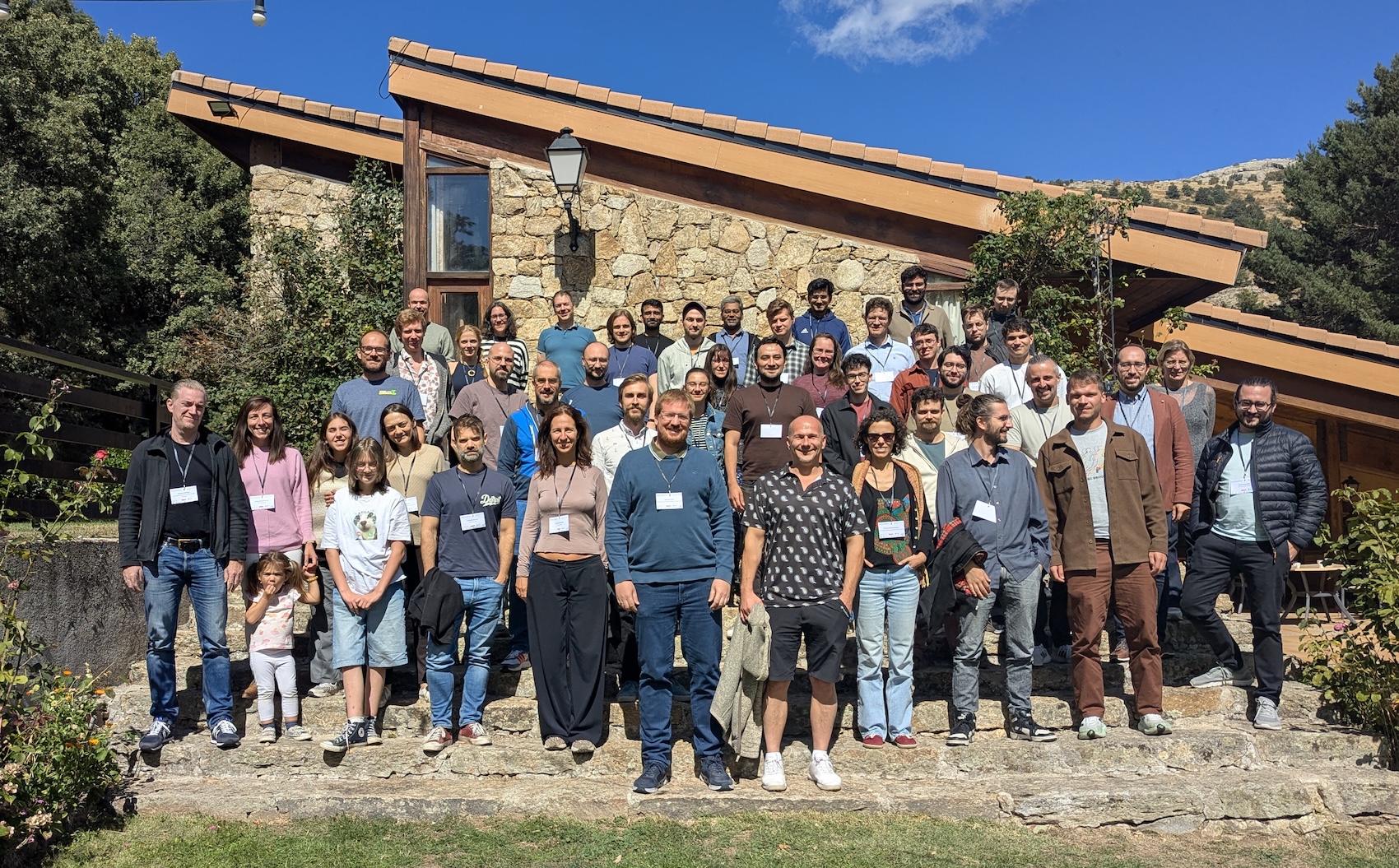MOLECULAR POLARITONICS 2025
September 21-25, 2025
Miraflores de la Sierra, Madrid
Organizers:
Paloma Arroyo Huidobro,
Costanza Toninelli,
Claudiu Genes
and
Johannes Feist
Info
The third edition of Molecular Polaritonics was held in Miraflores de la Sierra, Spain, from September 21 to September 25, 2025. Thanks to all the participants, and congratulations to the poster prize winners: André Garcia Primo (3rd prize), Oleg Kotov, and Dmitriy Dovzhenko (ex-aequo 1st prize)! The full-size group photo is available by clicking on the small version below.
Invited Speakers
- Thomas Allard, Universidad Autónoma de Madrid, Spain
- Carlos Antón Solanas, Universidad Autónoma de Madrid, Spain
- Kristín Björg Arnardóttir, Molecular Quantum Solutions, Copenhagen, Denmark
- Anael Ben-Asher, Universidad Autónoma de Madrid, Spain
- Cristina Benea-Chelmus, EPFL, Lausanne, Switzerland
- Clàudia Climent, Universitat de Barcelona, Spain
- Daniele De Bernardis, LENS, European Laboratory for Non-Linear Spectroscopy, Florence, Italy
- Milena De Giorgi, CNR Nanotec, Institute of Nanotechnology, Lecce, Italy
- Marit Fiechter, ETH Zürich, Switzerland
- Christophe Galland, EPFL, Lausanne, Switzerland
- Pedro David García, Instituto de Ciencia de Materiales de Madrid, Spain
- Gerrit Groenhof, University of Jyväskylä, Finland
- Burak Gurlek, Max Planck Institute for the Structure and Dynamics of Matter, Hamburg, Germany
- Stephan Götzinger, Max Planck Institute for the Science of Light, Erlangen, Germany
- Markus Kowalewski, University of Stockholm, Sweden
- Betül Kücüköz, Chalmers University of Technology, Gothenburg, Sweden
- Jean-Sébastien Lauret, ENS Paris-Saclay, France
- Nicolò Maccaferri, Umeå University, Sweden
- Diana Serrano, Chimie ParisTech, CNRS, Paris, France
- Karolina Słowik, Nicolaus Copernicus University, Torún, Poland
- Anton Zasedatelev, Aalto University, Helsinki, Finland
Organizers
- Paloma Arroyo Huidobro, Universidad Autónoma de Madrid, Spain
- Johannes Feist, Universidad Autónoma de Madrid, Spain
- Claudiu Genes, TU Darmstadt, Germany
- Costanza Toninelli, LENS, European Laboratory for Non-Linear Spectroscopy, Florence, Italy
Introduction
This workshop will bring together researchers with expertise in light-matter interactions, with a particular focus on molecular polaritonics. It will cover topics such as quantum optics & open quantum systems, quantum chemistry, condensed matter & many-body physics, and macroscopic QED. The goal is to facilitate communication among different fields and between theory and experiment, as well as to assess and discuss current and possible future applications and technological promises of molecular polaritonics. The workshop will be held in a highly interactive format, with ample time for discussions and informal interactions.
In addition, this workshop aims at providing a model for gender balanced workshops and strives to ease the participation of participants accompanied by children by providing local childcare and covering travel costs for accompanying children.
This year’s edition is the third one following the success of Molecular Polaritonics 2019 in Miraflores de la Sierra, Spain, and Molecular Polaritonics 2022 in Straubing, Germany.
Organizational information
The workshop will be held in the residence “La Cristalera” in Miraflores de la Sierra, a small village in the mountains near Madrid. All participants will stay at the residence, and food will be provided there as well, starting with dinner on Sunday, Sep 21, until breakfast on Thursday, Sep 25. For further details and travel information see the venue page.
There is no registration fee, and all local costs (food and accommodation) are covered by the organizers. Travel to and from Miraflores is not included, however.
The workshop is supported by the TIMELIGHT and QUINTESSEnCE ERC grants, the Condensed Matter Physics Center (IFIMAC) at the Universidad Autónoma de Madrid through the María de Maeztu Grant CEX2023-001316-M, and the Max Planck Institute for the Science of Light and TU Darmstadt.
Registration is closed.

 Molecular Polaritonics 2025
Molecular Polaritonics 2025